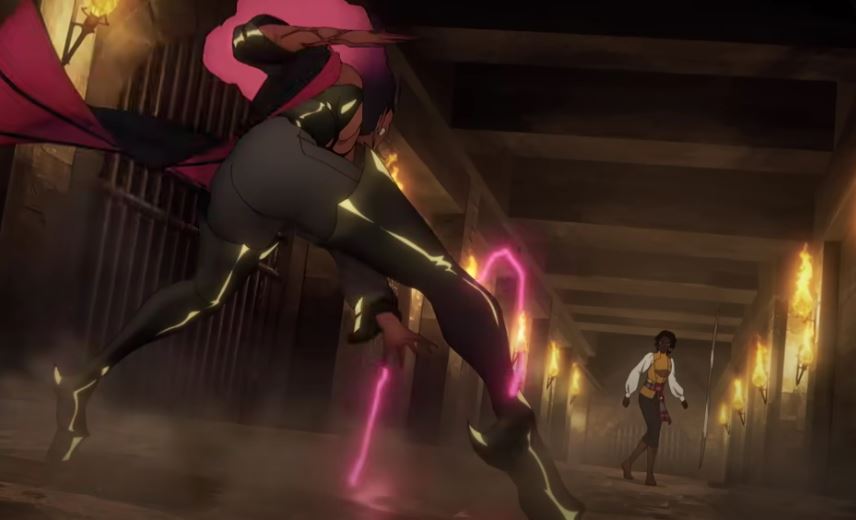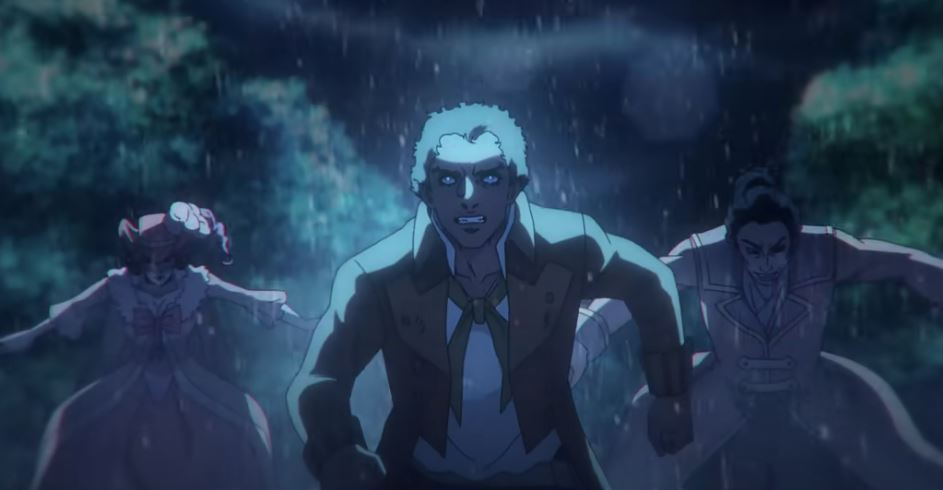One of the most interesting teases of the trailers for this new Castlevania series was the setting. The first series did some interesting things regarding religion and the role of the church in society, so seeing that Nocturne takes place during the French Revolution set my mind ablaze with possibilities. Vampires are often portrayed among the upper hierarchies of society to begin with. Richter and company resisting vampire rule against the backdrop of one of the most famous revolutions in the history of the world? Sounds like a winner, especially if Nocturne didn’t hold back.
Thankfully, they didn’t. Castlevania: Nocturne rules, making for an excellent sequel that looks like it may surpass the original series in every way.

What’s even better is how Nocturne wastes no time throwing those punches, letting the audience know right away what the blunt, unsubtle messaging of this series will be. Vampires are the aristocracy of the world, literally enriching themselves off the blood of the oppressed from opulent estates isolated from the citizens they rule. Maria Renard basically runs her village’s sect of the French resistance sweeping the country. Annette and Edouard swiftly enter the picture as former slaves from the recent revolution against the French in modern-day Haiti.
By the time the main vampire villain enters the picture, a god-like vampire who comes to France with ambitions of worldwide conquest (aka colonization), the point couldn’t be clearer. This is a story of resistance, of the traumatized and oppressed rising up against their traumatizers and oppressors, and Nocturne never wants you to forget that. Every moment, every decision these character make, is informed by their need to end the inequality that is ruining humanity. And here’s the thing; they couldn’t have honestly used this setting any other way.
Castlevania dedicates considerable narrative space to the idea of upsetting long-established norms, and the way the struggle to do so can feel downright impossible. Using vampires as the face of this evil is perfect. Their immortality represents the seeming immortality of exploitative power structures in the world, their craving for blood a literal representation of the way higher tiers of society exploit those beneath them. They seem otherworldly and incomprehensible, with power those beneath them cannot hope to match. Even if you succeed against one of them, there always seems to be another, since they can so easily corrupt those around them.
While no villain in Nocturne is so well-fleshed out as Dracula (depending on whether you view Olrox purely as a villain), they are brutally effective as a more simple evil. These vampires revel in the injustices they inflict upon humanity, without pity or remorse. Those beneath them exist purely for their own goals.
Is it a simplistic, black-and-white view of the French Revolution and those like it at the time which began the violent shift away from monarchies and colonization? Yes, but that doesn’t make it any less compelling to watch.
Every character has some past that put them on one side or another throughout history, though mostly on the oppressed side. Maria fights for the French Revolution in her town. Her mother, Tara, escaped the main villain’s control back in Russia. Even Olrox, something of an anti-hero throughout these first eight episodes, has a past defined by the oppression of colonization. He’s a vampire from the Aztec civilization who watched his culture and society wiped from the map, and seems to view this fate as inevitable for any who oppose those stronger than themselves.
(Through him, we learn that Richter’s mother may have helped colonization efforts against indigenous American tribes, though her conscious complicity in those events is obviously uncertain since she was just hunting vampires.)
Annette and Edouard clearly represent this theme more than anyone else, and the episode showing their past in Saint Domingue is easily one of my favorites of the season. They serve an important role both as validation of the idea that the world can change and proof of how damn tough it is. Castlevania does not shy away from the two of them being Black, or that they are former slaves who fought for their freedom. This real world fact is not hidden behind the metaphor of humans freeing themselves from vampires, but rather exists alongside it. They are both resisting supernatural vampires AND resisting real-world slavery and racism.
Edouard’s forced transformation into a night creature initially felt like a cruel twist, but instead served to further deepen his impact on the themes of Nocturne. His refusal to do the bidding of the abbot, and eventual success in turning other night creatures to his side, further represents the strength and resistance needed to win the fight against the oppressors of the world who are so entrenched in their power. He serves as the inspired ideal Annette, Richter, and Maria strive to live up to and his character arc actually improved.

If there’s a flaw to this approach, it’s that Nocturne didn’t quite find a way to fit Richter into these themes. I love Richter in this show, and how he resembles Trevor in a way that helps establish familiar Belmont traits, but still has his own personality. Unfortunately the show doesn’t really find a way to fit him into the struggles, thematic or otherwise, that drive the rest of the cast and narrative. He’s just the Belmont vampire killer who has to exist in any Castlevania property, whose character and power development exists outside of the fight for freedom.
I don’t think this is THAT big of an issue, though. I like Richter, I like his arc, and it certainly doesn’t detract from the events around him. None of this is meant to suggest that Richter’s arc, or the usual Belmont Castlevania content fans are here here for, is shortchanged. I loved the stuff between Richter and Juste Belmont, and how it helped him come to terms with the death of his mother.
At worst, he simply struggles to fit in naturally, but his dynamic with Maria and Tera alleviates this problem for most of the season.
As expected from the first series, Nocturne also takes the baseline things we know about the game being adapted and manages to retain those elements, even with how drastically different it all is. I love that Maria fights with summoned animals, just like in Rondo of Blood. Richter gets his headband and general overall visual aesthetic. There’s still a romance between him and Annette, even if Nocturne largely just introduces the concept rather than use it as the jumping off point of the story. Tera being turned in the final episode might be a step in the direction of Richter eventually rescuing all of his compatriots later.
Obviously this is going in a very different direction, though. We have no hint of Dracula’s return, and Erzsebet Báthory seems well positioned to replace him as the main villain. It wouldn’t even make much sense at the moment for Dracula to be a villain again. Alucard made his return now, where the games have him wake up after three-hundred years asleep because of Richter’s corruption and disappearance.
Throw in the central narrative around revolution and upending power structures, and there’s a lot more to cover here than any Castlevania game would have time for. Could Shaft show up in season 2 and push this back towards canon game story beats? Sure, but right now this is largely original, much like the original Castlevania was post-Dracula.
Hopefully this show will keep refusing to pull its punches. The main strength of this series is the way it fully dedicated itself to a story of resistance and revolution, and I want to see this explored to its fullest potential. I want to see Edouard build a full night creature army that resists their intended nature, and Tera to do the same as a newly-turned vampire. I want Annette and Maria to grow and lead resistance movements from the ground up and to see if Olrox grows away from his selfish fear to join the right side of the fight, or dies in opposition to the heroes because of his inability to to do so.
As of now, I have total faith in the direction Nocturne is taking this story. Castlevania was an important step in credibility for video game adaptations, and it’s great to see this new series live up to that.
Images Courtesy of Netflix
Have strong thoughts about this piece you need to share? Or maybe there’s something else on your mind you’re wanting to talk about with fellow Fandomentals? Head on over to our Community server to join in the conversation!

